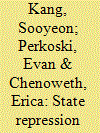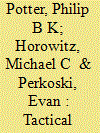|
|
|
Sort Order |
|
|
|
Items / Page
|
|
|
|
|
|
|
| Srl | Item |
| 1 |
ID:
170010


|
|
|
|
|
| Summary/Abstract |
Armed groups are prone to instability and fragmentation, but what explains variation among the new groups that emerge? I argue that the internal politics preceding organizational splits is critical. When it comes to the survival of breakaway groups, those forming around single issue areas gain an advantage by attracting more homogeneous, preference-aligned recruits. On the other hand, those forming over a variety of grievances attract a more heterogeneous population whose divergent views undermine cohesion and cooperation, necessitate hierarchy, and diminish the odds of organizational survival. I test this argument with a case study of two Republican groups from Northern Ireland—the Real Irish Republican Army and the Irish National Liberation Army. The findings confirm my argument and underscore the limited utility of studying organizational fractures from the sole perspective of contemporaneous external events like conciliation and repression. Rather, I show how internal political dynamics influence the composition, identity, and overall trajectory of breakaway groups. This has implications for designing effective counterinsurgent policies, for understanding the formation of armed groups, and for anticipating whether breakaway groups are likely to escalate, moderate, or adopt spoiling behavior.
|
|
|
|
|
|
|
|
|
|
|
|
|
|
|
|
| 2 |
ID:
162761


|
|
|
|
|
| Summary/Abstract |
Cyberspace affords actors unprecedented opportunities to carry out operations under a cloak of anonymity. Why do perpetrators sometimes forgo these opportunities and willingly claim credit for attacks? To date, the literature has done little to explain this variation. This article explores the motivations behind voluntary credit-claiming for the two main actors in cyberspace: states and politically motivated nonstate actors. We argue that states are most likely to claim credit for their operations and to do so privately when the goal is to coerce an opponent. Nonstate actors tend to publicly claim credit for their attacks in order to showcase their capabilities, influence public opinion, and grow their ranks. We use case narratives to assess the plausibility of our argument and find strong support. This article places cyberspace operations in conversation with the larger literature on secrecy in international relations and advances a common framework for understanding how both states and nonstate actors operate in this evolving domain.
|
|
|
|
|
|
|
|
|
|
|
|
|
|
|
|
| 3 |
ID:
155781


|
|
|
|
|
| Summary/Abstract |
In this article, we review decades of research on state repression and nonviolent resistance. We argue that these two research programs have converged around six consensus findings. We also highlight several areas of divergence, where greater synthesis between the research on state repression and nonviolent resistance might prove useful. We draw attention to remaining controversies surrounding the association between state repression and nonviolent resistance—particularly regarding different theoretical assumptions about structure, agency, and strategic choice; measurement challenges for both repression and dissent; methodological challenges regarding endogeneity, multicausality, and equifinality; and moral hazards associated with the study of nonviolent resistance and the effectiveness of repression. We conclude by highlighting some productive ways forward.
|
|
|
|
|
|
|
|
|
|
|
|
|
|
|
|
| 4 |
ID:
158378


|
|
|
|
|
| Summary/Abstract |
Militant groups, like all organizations, carefully consider the tactics and strategies that they employ. We assess why some militant organizations diversify into multiple tactics while others limit themselves to just one or a few. This is an important puzzle because militant organizations that employ multiple approaches to violence are more likely to stretch state defenses, achieve tactical success, and threaten state security. We theorize that militant organizations respond to external pressure by diversifying their tactics to ensure their survival and continued relevance, and that the primary sources of such pressure are government repression and interorganizational competition. We find consistent support for these propositions in tests of both the Global Terrorism Database (GTD) and Minorities at Risk Organizational Behavior (MAROB) data sets. We bolster these findings with an additional specification that employs ethnic fractionalization in the first stage of a multi-process recursive model. These findings are relevant not only for academic research but for policy as well. While it is difficult for countries to anticipate the character of future tactical choices, they may be able to anticipate which groups will most readily diversify and thereby complicate counterterrorism efforts.
|
|
|
|
|
|
|
|
|
|
|
|
|
|
|
|
|
|
|
|
|